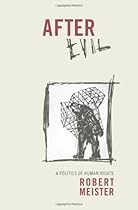Read After Evil: A Politics of Human Rights (Columbia Studies in Political Thought/Political History) by Robert Meister Online
! Read * After Evil: A Politics of Human Rights (Columbia Studies in Political Thought/Political History) by Robert Meister ↠ eBook or Kindle ePUB. After Evil: A Politics of Human Rights (Columbia Studies in Political Thought/Political History) He boldly challenges the empty moral logic of "never again" or the theoretical reduction of evil to a cycle of violence and counterviolence, broken only once evil is remembered for what it was. The way in which mainstream human rights discourse speaks of such evils as the Holocaust, slavery, or apartheid puts them solidly in the past. This approach to history, common to late-twentieth-century humanitarianism, doesn't presuppose that evil ends when justice begins. Its elaborate techniques

| Title | : | After Evil: A Politics of Human Rights (Columbia Studies in Political Thought/Political History) |
| Author | : | |
| Rating | : | 4.94 (694 Votes) |
| Asin | : | 0231150377 |
| Format Type | : | paperback |
| Number of Pages | : | 544 Pages |
| Publish Date | : | 2015-12-17 |
| Language | : | English |
Robert Meister is professor of social and political thought at the University of California, Santa Cruz. An active participant in California higher education politics, he is director of the Bruce Initiative on Rethinking Capitalism at UCSC and the author of Political Identity: Thinking Through Marx.
(Debra L. Human rights as we know them today are explicitly intended to limit the promise of justiceboth because the horrors of the twentieth century suggest that such promise might come at too high a cost, and because the promise of justice as greater political and social equality is opposed by the post-Cold War powers. (Joe Hoover Journal of Intervention and Statebuilding)Thoughtful and thought-provoking. "After Evil is a large, even magisterial book This ambitious and persuasive book charts human rights as an ethical philosophy, a symbolic relation between subjects,
He boldly challenges the empty moral logic of "never again" or the theoretical reduction of evil to a cycle of violence and counterviolence, broken only once evil is remembered for what it was. The way in which mainstream human rights discourse speaks of such evils as the Holocaust, slavery, or apartheid puts them solidly in the past. This approach to history, common to late-twentieth-century humanitarianism, doesn't presuppose that evil ends when justice begins. Its elaborate techniques of "transitional" justice encourage future generations to move forward by creating a false assumption of closure, enabling those who are guilty to elude responsibility. Merging examples from literature and histor
Download After Evil: A Politics of Human Rights (Columbia Studies in Political Thought/Political History)
Download as PDF : Click Here
Download as DOC : Click Here
Download as RTF : Click Here
